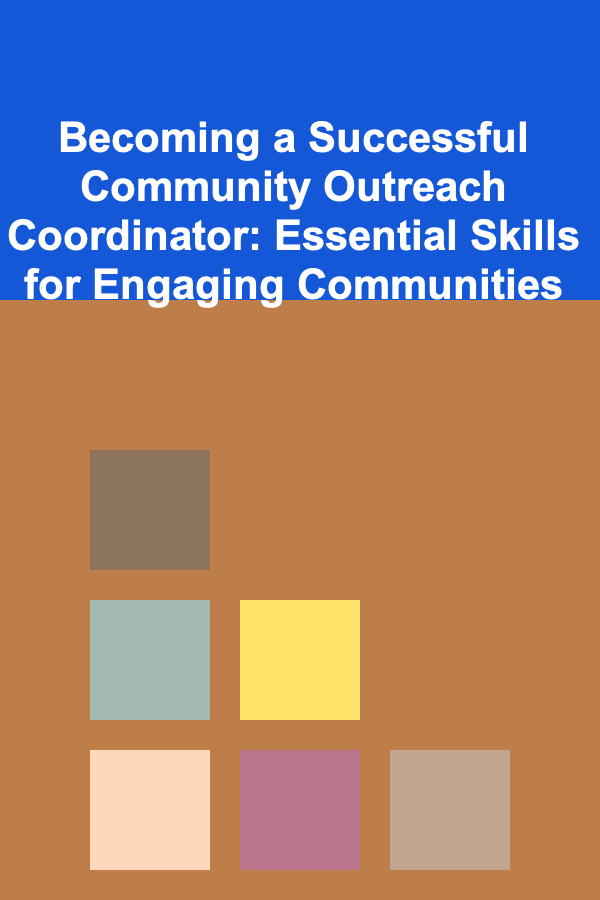
Becoming a Successful Community Outreach Coordinator: Essential Skills for Engaging Communities
ebook include PDF & Audio bundle (Micro Guide)
$12.99$10.99
Limited Time Offer! Order within the next:

Community outreach coordinators play a pivotal role in bridging the gap between organizations and the communities they serve. Whether the goal is to raise awareness about a cause, gather support for a program, or ensure that people have access to resources, a skilled outreach coordinator makes all the difference. However, the responsibilities of an outreach coordinator are far from simple, and becoming effective in this role requires a range of skills---both technical and interpersonal.
In this actionable guide, we'll explore the essential skills needed for a community outreach coordinator, breaking down each one with practical insights and strategies that can help you succeed in engaging diverse communities.
Strong Communication Skills
As an outreach coordinator, your primary job is to communicate---whether it's through one-on-one conversations, public presentations, social media, or written materials. Effective communication is crucial for ensuring that your message resonates with different audience groups.
Actionable Tips for Enhancing Communication:
- Tailor your Message: Adjust your communication style and content based on your audience. For instance, a message to a youth audience should be engaging, interactive, and possibly digital-focused, while a message to senior citizens might need to be more formal and use printed materials.
- Be Clear and Concise: Clarity is essential. Avoid jargon and overly complex language. Instead, break down key points in a simple, understandable manner.
- Active Listening: Communication isn't just about talking; it's also about listening. Listen carefully to the concerns, feedback, and ideas of community members to build trust and adapt your approach based on their needs.
Cultural Competency and Sensitivity
Communities are often diverse, comprising people from various ethnic backgrounds, languages, and socio-economic statuses. As an outreach coordinator, cultural competence is crucial for ensuring that your efforts are inclusive and respectful of these differences.
Actionable Tips for Cultural Sensitivity:
- Do Your Research: Learn about the cultural norms, values, and traditions of the community you are engaging with. This includes understanding local customs, language preferences, and the specific needs of different demographic groups.
- Diversify Outreach Materials: Make sure that your outreach materials---whether flyers, websites, or event promotions---reflect the community's diversity. This could mean translating materials into different languages or showcasing people from various cultural backgrounds in images and messaging.
- Respect Community Leaders: Every community has its own set of trusted influencers or leaders. By engaging with these individuals and acknowledging their influence, you can build bridges more effectively within the community.
Empathy and Relationship-Building
Empathy is at the core of building lasting relationships in community outreach. When people feel understood and valued, they are more likely to engage with your program and take part in initiatives. Being able to relate to others on a human level is critical for an outreach coordinator.
Actionable Tips for Building Relationships:
- Engage in Meaningful Conversations: When you meet community members, focus on building genuine relationships. Ask open-ended questions, listen actively, and show sincere interest in their opinions.
- Be Consistent: Building trust takes time. Make sure to regularly check in with community members and show up to events or activities to demonstrate your commitment to the community.
- Highlight Community Strengths: Rather than focusing solely on challenges, also acknowledge the strengths and positive aspects of the community. People are more likely to engage in initiatives that celebrate and empower their collective achievements.
Project Management and Organizational Skills
Community outreach often involves coordinating multiple tasks, events, and initiatives simultaneously. From planning events to managing volunteers, time and task management are essential skills for staying on track and ensuring everything runs smoothly.
Actionable Tips for Enhancing Organizational Skills:
- Set Clear Goals: Begin every outreach effort with clear, measurable goals. This will help guide your activities and ensure you stay focused on the most important tasks.
- Create a Timeline: Break your projects into phases and create a realistic timeline for each. This could include event planning, follow-ups, and any logistical requirements such as materials or venues.
- Delegate: Don't try to do everything yourself. Leverage the skills of volunteers, colleagues, and other stakeholders. Assign responsibilities and trust others to execute them effectively.
- Use Technology: Tools like Google Calendar, project management software (e.g., Asana, Trello), and communication platforms (e.g., Slack) can help streamline organization and communication.
Problem-Solving and Adaptability
Things don't always go according to plan in community outreach. Whether it's a change in venue, a shift in community priorities, or unforeseen logistical challenges, a successful outreach coordinator must be able to quickly assess problems and pivot accordingly.
Actionable Tips for Problem-Solving:
- Anticipate Challenges: Try to foresee potential issues before they arise. By identifying obstacles early on, you can take proactive steps to address them.
- Stay Calm Under Pressure: When challenges occur, stay composed. Take a step back, assess the situation, and consider the best course of action.
- Be Open to Feedback: If something isn't working, ask for feedback from the community or your team members. They may have valuable insights or suggestions for improvement.
Marketing and Promotion Skills
No matter how valuable your program or initiative may be, if people aren't aware of it, they won't participate. Marketing is an essential part of community outreach, and outreach coordinators must know how to promote their initiatives effectively.
Actionable Tips for Effective Promotion:
- Use Social Media: Platforms like Facebook, Instagram, Twitter, and LinkedIn are powerful tools for reaching large groups. Tailor your posts to the platform (e.g., engaging images for Instagram, in-depth articles for LinkedIn).
- Leverage Local Media: Engage with local radio stations, newspapers, and community newsletters to promote your program. Local media outlets often have established relationships with the community and can help spread your message to a wider audience.
- Involve Community Members in Promotion: Empower community members to help promote the program. This can be through word-of-mouth, sharing social media posts, or helping to organize promotional events. When the community feels invested in the program, they're more likely to help spread the word.
Data Analysis and Evaluation
To ensure that your outreach efforts are successful, you need to assess their impact. Analyzing data and evaluating your initiatives allows you to understand what's working and what needs improvement. A community outreach coordinator should be able to gather and analyze feedback, then use that data to refine future strategies.
Actionable Tips for Effective Evaluation:
- Set Key Performance Indicators (KPIs): Define success before launching your program. Are you measuring attendance, engagement, or the number of people who access services? Having clear KPIs will help you assess your efforts.
- Gather Feedback: Regularly ask for feedback from community members through surveys, focus groups, or informal conversations. This feedback is invaluable for improving your outreach.
- Use Data to Adjust: Don't be afraid to change your approach based on the feedback and data you collect. This iterative process will help you improve future outreach efforts and ensure continued success.
Leadership and Team Management
As an outreach coordinator, you may work with a team of volunteers, staff members, and other stakeholders. Being an effective leader means being able to motivate and guide your team, keeping them focused on the mission while ensuring a positive work environment.
Actionable Tips for Effective Leadership:
- Provide Clear Direction: Ensure everyone on your team understands the goals of the outreach program and their individual responsibilities. This clarity will help everyone stay aligned and contribute effectively.
- Foster Collaboration: Encourage teamwork and open communication among team members. Collaboration often leads to creative ideas and more effective problem-solving.
- Recognize and Appreciate Contributions: Acknowledge the efforts of your team members, whether through public recognition or small tokens of appreciation. This can boost morale and increase engagement.
Conclusion
Being a successful community outreach coordinator requires a mix of skills, including strong communication, cultural sensitivity, empathy, and organizational abilities. To truly engage and empower communities, coordinators must be adaptable, skilled in promotion, and able to evaluate their efforts for continuous improvement. Above all, it's about building trust and fostering genuine relationships with community members. With the right mindset, dedication, and tools, you can make a lasting impact in the communities you serve.
Reading More From Our Other Websites
- [Organization Tip 101] How to Use Baskets and Bins for Bedroom Storage
- [Home Rental Property 101] How to Provide the Best Customer Service for Your Tenants
- [Rock Climbing Tip 101] Essential Climbing Gear Checklist: What Every Beginner Needs
- [Organization Tip 101] How to Safely Clean and Care for Antique Textiles
- [Home Budget Decorating 101] How to Style Shelves for a Beautiful Home Without High Costs
- [Home Cleaning 101] How to Maintain a Dust-Free Home with Minimal Effort
- [Home Space Saving 101] How to Create More Space in Your Home with Hidden Storage
- [Home Family Activity 101] How to Teach Your Kids the Basics of Gardening Together
- [Hiking with Kids Tip 101] Adventure Awaits: How to Make Family Hikes Fun and Stress-Free
- [Organization Tip 101] The Ultimate Guide to Choosing the Right HVAC Filter

How to Store Shoes and Boots in a Small Closet
Read More
How to Use Outdoor Lighting to Enhance Home Security
Read More
The Executive Assistant's Playbook: Managing High-Level Tasks with Precision
Read More
How To Play Educational Simulators
Read More
How To Master Regular Expressions for Data Validation
Read More
10 Tips for a Job Application Checklist for Executive Roles
Read MoreOther Products

How to Store Shoes and Boots in a Small Closet
Read More
How to Use Outdoor Lighting to Enhance Home Security
Read More
The Executive Assistant's Playbook: Managing High-Level Tasks with Precision
Read More
How To Play Educational Simulators
Read More
How To Master Regular Expressions for Data Validation
Read More